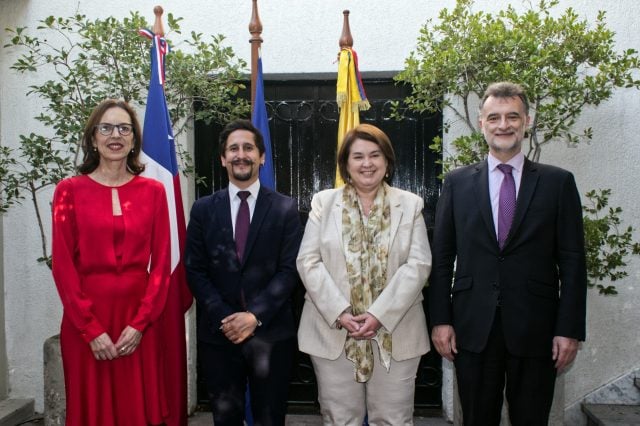Original article: Reunión de CELAC y Unión Europea en Chile: Alianza clave para la «Triple Transición»
At the European Union residence in Chile on Wednesday, October 22, Ambassador Claudia Gintersdorfer and the Colombian Ambassador to Chile, Sebastián Guanumen, hosted a gathering that welcomed diplomatic representatives from CELAC countries and the European Union ahead of the IV CELAC-European Union Summit to be held in Santa Marta, Colombia.
The Colombian city of Santa Marta will serve as the venue for the IV CELAC-European Union Summit on November 9 and 10. The meeting aims to revitalize the strategic partnership and focus its agenda on the Triple Transition—green, digital, and social—with Chile playing a constructive and strategic role due to its existing “new generation” bilateral agreements.
Claudia Gintersdorfer, the European Union Ambassador to Chile, emphasized that the strategic partnership with Latin America has become a “vital alliance in the context of the profound geopolitical uncertainty surrounding us.” She also highlighted that in the current environment, Europe positions itself as a stable partner that respects sovereignty and promotes equal dialogue. In her speech, she stated that the 60 countries, united by a common vision, must leverage their powerful voice in multilateral forums to defend a rule-based international order.
Colombian Ambassador Sebastián Guanumen, whose country holds the Pro Tempore Presidency, confirmed that the Triple Transition will be the primary strategic focus at the Summit, essential for regional security and economic well-being. Guanumen detailed that the agenda seeks to promote actionable initiatives such as the advancement of “renewable energies, decarbonization, and regional electrical interconnection with European cooperation, alongside inclusive digitalization, climate financing, and the protection of strategic ecosystems.”
Chile is critical to developing this agenda. Claudia Gintersdorfer highlighted that the progress made by 2025 in bilateral relations under the new Advanced Framework Agreement and the Interim Trade Agreement demonstrates the path forward, characterizing Chile as a “very constructive partner in the bi-regional relationship.” The importance of the country is underscored by direct investment and technological collaboration: “An example of this is all the work being done from Chile for the continent with the European satellite system Copernicus or the funding platform for green hydrogen projects.”
To enhance this structural change, the Summit will assess the implementation of the Global Gateway Investment Agenda, a cooperation tool mobilizing 45 billion euros by 2027. Guanumen stressed that this fund is crucial for the region, mobilizing resources through 134 strategic projects in key sectors such as energy, critical raw materials, digitalization, infrastructure, health, and social cohesion—issues that directly impact Chile’s commercial interests and productive capacities.
In addition to economic and environmental discussions, the Summit will address social justice, aiming to renew political commitment through the “Santa Marta 2025” Declaration. It will work on healthcare self-sufficiency, sustainable agriculture, gender equity through the Bi-regional Care Pact, as well as tackling security and transnational organized crime.

